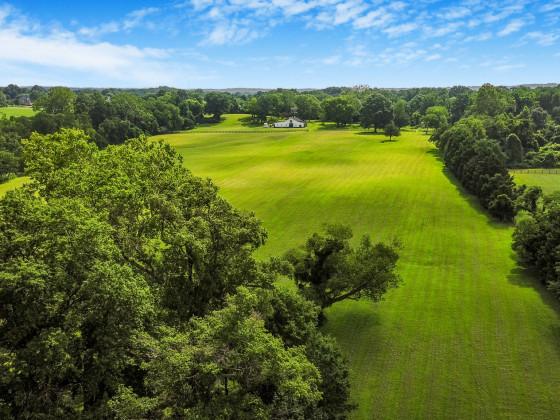What's Hot: What Is In The Big New Housing Bill?
 Carless Projects Prohibit Parking, But Will DC Enforce It?
Carless Projects Prohibit Parking, But Will DC Enforce It?
✉️ Want to forward this article? Click here.
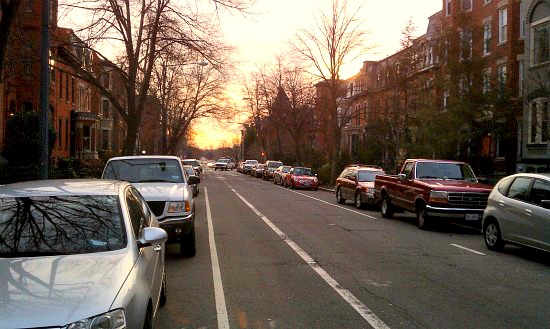
Wait, is that an open parking spot on R Street?
Parking legally in DC is cheap, and for most residents, it’s easy to get a permit to park on the street. The challenge is finding a spot, and in many neighborhoods that’s becoming more difficult all the time.
For years, DC’s Department of Transportation (DDOT) has told residents, developers, ANCs and other stakeholders that a review of the city’s parking regulations, which determine who can park where, is underway. UrbanTurf found references to an ongoing, comprehensive review of the District’s parking program dating back to at least 2004. DDOT often seems on the verge of a big announcement. The announcement, if it’s ever made, is usually walked back or mysteriously ignored.
The lack of parking is an increasingly contentious topic, especially as developers propose residential projects with little or no parking in the city’s most popular places to live. Developers say the projects will attract a younger, carless clientele, and to secure neighborhood support, they’re promising to limit or prohibit residential parking permits, or RPPs, at the new developments. But under the city’s current RPP program, it’s impossible to enforce bans or limits on parking at a specific address.
In recent years city councilmembers have tried to introduce legislation that would do what DDOT hasn’t: Make binding developers’ promises to prevent residents of parking-poor buildings from obtaining RPPs. Those attempts have failed.
Today, UrbanTurf is taking a close look at the issue, from the planned buildings to the possible solutions.
An unenforceable promise
Current residential projects seeking or receiving exceptions to parking rules in DC include, but are far from limited to, the 90 units planned for Dupont Circle’s Patterson House by SB-Urban; 60 units under construction for 14th Street and Wallach Place NW by Madison Investments; 38 units planned for Logan Circle by Rosebusch LLC; and 125 units proposed for Shaw, also by SB-Urban.
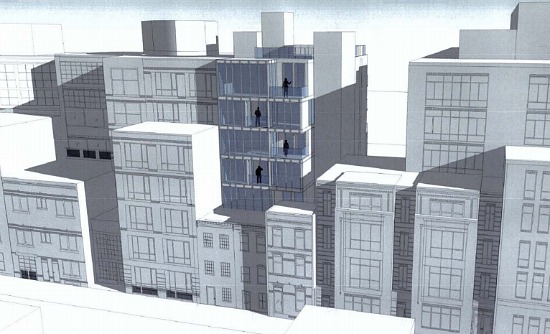
The proposed micro-units at 1456-1460 Church Street.
Those 313 units amount to a fraction of the planned developments seeking parking exemptions, but they’re notable for gaining traction among neighborhood ANCs, specifically because they have thoughtful transit plans aimed at making it easy for residents to get around without a car. The city is also scattered with smaller developments seeking parking exceptions and proposing to limit resident access to neighborhood parking, including a church rehab project at 819 D Street NE and a development at 1300 H Street NE.
What these developers have in common is a promise to prohibit some or all of their building tenants from obtaining an RPP. Here’s the problem: even if the developer, the ANC and the BZA agree a new building’s residents shouldn’t get RPPs, DDOT can’t enforce it.
Gregg Busch and Brook Rose, developers of the proposed micro-unit project on the 1400 block of Church Street, have come up with one of the most comprehensive ways to monitor RPPs. In addition to putting the restriction into the lease agreement, a tactic most of the mentioned developers plan to use, they’ll submit a Freedom of Information Act (FOIA) request to the DMV periodically to ensure no RPPs have been granted to residents. If a resident has an RPP, they will be found in violation of the lease and may be evicted.
Though it’s more earnest than what many developers propose, the plan is not without flaws. Even if the RPP restriction stays with the building in perpetuity, a provision the BZA is generally demanding from developers, it leaves all of the enforcement up to the owner or management company once the building is constructed. Repeatedly submitting FOIAs to the DMV on a set schedule is tedious. And if residents are found breaking the rules, those charged with enforcement have an obvious interest in keeping units filled rather than kicking noncompliant residents out. The Church Street project goes before the BZA for a final review on April 1.
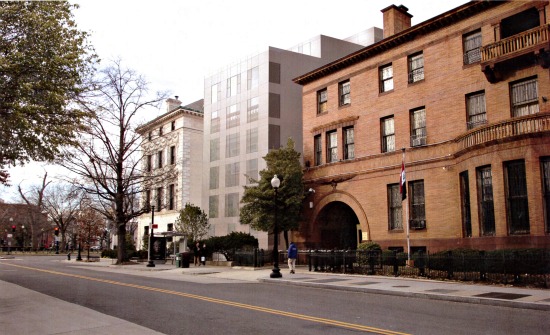
A rendering of the proposal for 15 Dupont Circle from SB-Urban and Hartman-Cox.
For the Patterson Mansion project, SB-Urban hired transportation consultants Wells and Associates to put together a transportation management plan for the site. The project is set to appear before the BZA in the coming months and secured the full support of ANC 2B. SB-Urban’s extensive plans to help residents live happily sans-car earned nothing but praise from the ANC, but the developer was also working with a unique advantage: buildings sitting on Dupont Circle currently aren’t eligible for RPPs anyway.
Getting neighborhood support for their recently-proposed Blagden Alley project could be more complicated. Those blocks are zoned for RPP, and despite ANC enthusiasm for the project’s initial design, two neighbors have already vowed to oppose it if it doesn’t offer parking. At a recent meeting, SB-Urban’s Brook Katzen sounded confident that the building’s residents would be prohibited from obtaining RPPs. Similarly, the Patterson House project’s transportation plan promises to “remove the property from the list of properties eligible for RPP.”
But Reggie Sanders, DDOT’s spokesman, confirmed that the agency does not have a list of buildings with restricted parking and cannot enforce developer-imposed restrictions. The system is based on where people can park, not where they can’t.
“DMV keeps records of where residential permits have been issued,” Sanders told us. “DDOT cannot currently restrict individual properties on blocks that are in the RPP system from getting permits.”
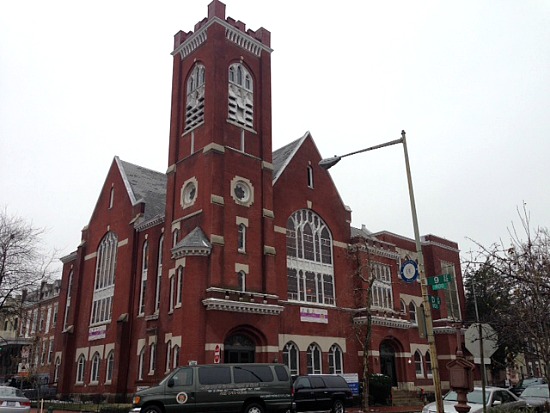
A church conversion planned at 819 D Street NE.
A ‘stopgap’ solution
Given companies’ difficulty in tracking RPPs, and their stake in keeping units rented, wouldn’t it make more sense for the city to enforce the bans?
“Absolutely it would be preferable,” ANC 2F’s Walt Cain said. “But in the absence of that, the stopgap of the management company assuming that responsibility is the best option we have. Is that a perfect option? No, it’s not. The best thing would be for DDOT to recognize that buildings are making this a part of their lease, and for [DDOT] to monitor where RPPs should be issued and where it shouldn’t be issued.”
But neighboring ANC 2B, which has similar parking issues, disagrees that such building-specific restrictions are the right solution. A January letter the ANC wrote to the Zoning Commission summarized the endemic parking issues and urged the city to come up with a comprehensive solution.
“ANC2B does not support the growing practice of prohibiting residents with certain addresses from obtaining residential parking permits as a ‘trade off’ with the neighborhood and Zoning Commission for reducing parking minimum requirements,” the resolution reads. “This practice rewards developers without a proven benefit to the neighborhood while dismissing the rights of tax-paying citizens to the same city services as others.”
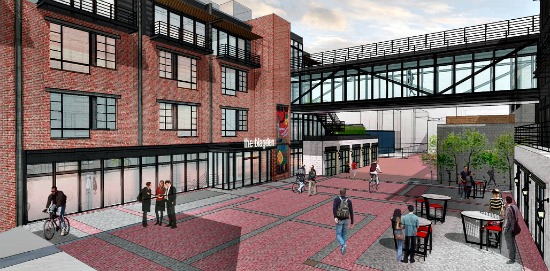
A preliminary design for the apartments for Blagden Alley.
Walt Cain believes if building-by-building restrictions were implemented, the market would take care of itself. Residents moving into buildings that prohibit tenants from obtaining RPPs will know what they’re getting themselves into, he suggested.
“If I choose to live there anyway, then I am accepting that one of the burdens of living in this building is not having access to [city parking],” Cain said. “[Developers] think the market is something that can bear out that restriction. That’s their business and it’s on the consumer to be aware.”
An outdated program and a long-promised review
DDOT can’t enforce the newly proposed restrictions because of the way that the RPP program currently functions. Its structure dates back to 1974, when it was introduced to keep commuters from using residential neighborhoods as free Metro parking lots. The program is laid out block-by-block, not area-by-area or building-by-building. That makes it impossible to set enforceable parking rules for a specific building.
The agency has been aware of the system’s problems since at least 2003, when a review pointed out that the block-by-block structure was “one of the major flaws in the current system”:
“RPP areas are not necessarily contiguous or consistent due to the peculiarities of the ballot process. If one lives in the area with the generally restrictive parking conditions, but does not live on an RPP block, one cannot get a parking sticker and is effectively treated in the same way as a visitor or commuter.”
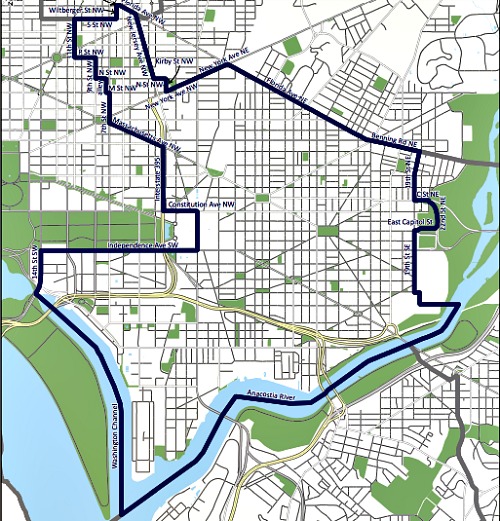
A map of Ward/Zone 6.
Today DDOT readily acknowledges it’s an imperfect system. Evian Patterson, the agency’s expert on the RPP program, acknowledged the agency was undergoing an RPP review at a recent ANC meeting.
“We’re going through a review right now to figure out how to uphold that restriction with buildings that said, ‘We [won’t] allow our residents to get an RPP,’” he said. But Patterson could not discuss when the review would be finished, what it may include or how DDOT’s RPP database might be modified to include building-specific restrictions.
As for the database itself, Patterson said, “It’s very antiquated and we have to update it. There are some addresses that we have missed.”
Though UrbanTurf was barred from interviewing Patterson directly, developers repeatedly mentioned receiving assurances from him, and Cain said if anyone could finish an effective RPP review, it was Patterson.
“We have gone through a cast of characters from DDOT,” Cain said. “My interaction with Evian has been the most positive interaction so far. He inspires confidence.”
Appeasement without enforcement
The problem is neatly summarized in a recent conflict on the northeast side of DC. When Rise Development proposed building a parking lot on top of a community garden near a proposed 30-unit condo building at 1300 H Street NE, neighbors protested. To secure the ANC’s blessing to move ahead, Rise’s Ben Miller agreed to build fewer spaces, save the garden and allow RPPs only for those residents who bought off-street parking, too.
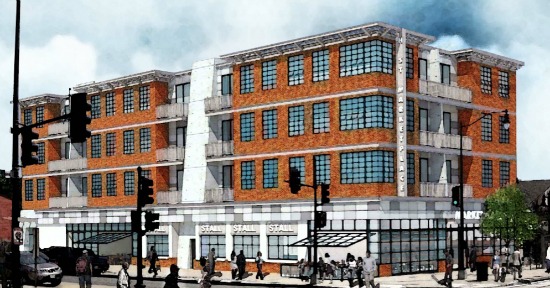
An early proposal for the R.L. Christian Library site.
It’s a tidy solution, but again, it’s unenforceable by the city. Miller told UrbanTurf the project was still at an early stage and said the company has not yet determined how to enforce the RPP limitations.
Madison Investments, the developer of a residential building without parking at 14th Street and Wallach Place NW, could offer a way forward, except they’re not quite sure how they’ll enforce the rule, either.
“The reality is, we have to put a clause into the leases that says you’re restricted from applying from a parking permit,” Madison principal, Barry Madani, told UrbanTurf. “It may not be the most effective strategy.”
Madani said the management company may hire a transit coordinator to help with enforcement, or have a doorman ensure residents aren’t driving off in cars with RPP permits, though he said he wasn’t looking to form a parking “Gestapo.”
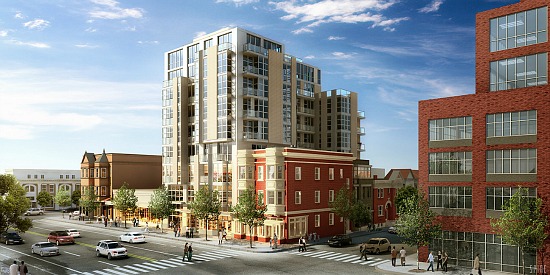
A rendering of a 56-unit development planned for 14th Street and Wallach Place NW. Courtesy of PGN Architects.
Twice, Ward 6 Councilman Tommy Wells has introduced bills that would enforce developers’ bans, but neither passed. The bill language would allow the mayor to designate a “property and residents of the property as ineligible to obtain residential parking permits” upon an owner’s request.
Such a solution is imperfect, said ANC 2B commissioner Noah Smith, who frequently works with DDOT.
“I don’t think we’re going to be able to rubber-stamp every developer who comes to us and says, ‘We don’t want parking minimums.’ We need to take a closer look at what it means,” Smith said.
But developers seem to think the buildings will fill up with ranks of the carless without too much trouble.
“We’re not anticipating people with cars wanting to move to our building,” Madani said. “It’s sort of a self-fulfilling prophecy. There are plenty of other buildings out there.”
See other articles related to: bza, dclofts, ddot, dmv, parking, residential parking permits, rpp, rpps, zoning commission
This article originally published at http://dc.urbanturf.production.logicbrush.com/articles/blog/carless_projects_prohibit_parking_but_will_dc_enforce_it/8297.
Most Popular... This Week • Last 30 Days • Ever
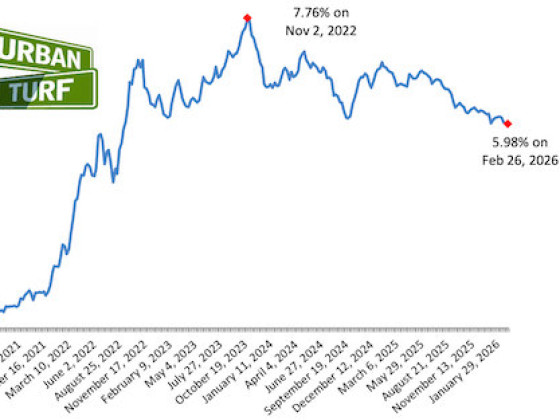
While it may seem like paying off a long-term mortgage early is a difficult task, it ... read »
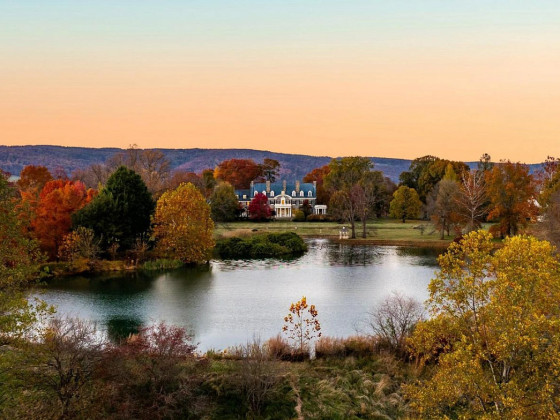
The property in Upperville known as Ayrshire Farm sold on Friday.... read »
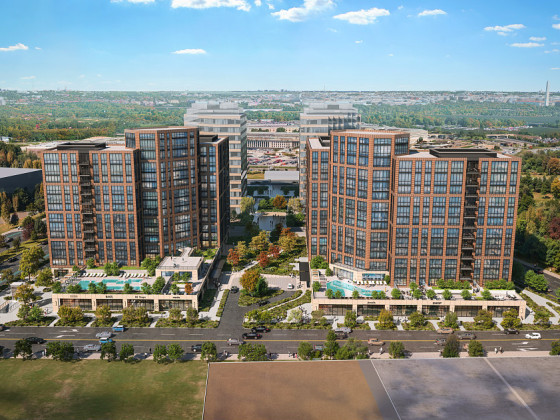
A new proposal is on the boards for the former home of the Transportation Security Ad... read »
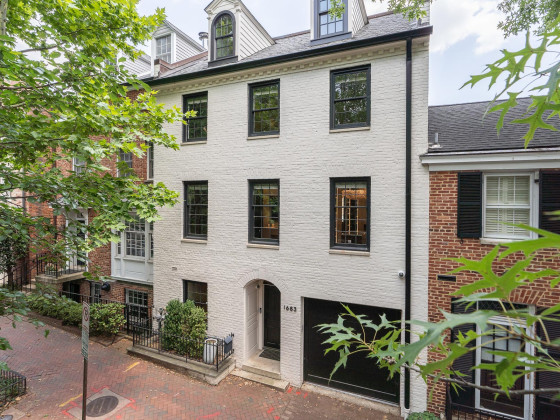
The classic Federal-style home recently underwent a dazzling, $2M renovation and boas... read »
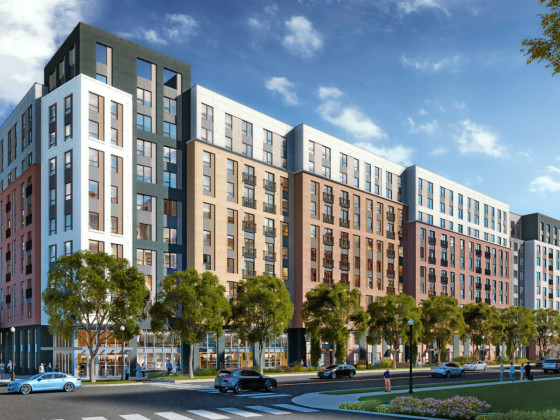
Even with a handful of projects being nixed over the last year, there are still a num... read »
- A Look at The Ways You Can Pay Off Your Mortgage Early
- Sandy Lerner's 570-Acre Virginia Farm Sells For $19.8 Million
- 637 Apartments, 31,000 Square Feet Of Retail: The New Plans for Pentagon City TSA Site
- A Pool, Elevator and Glass Roof: Luxuriously Renovated Georgetown Home Hits the Market
- The 6 Big Residential Projects In The Works Around National Landing
DC Real Estate Guides
Short guides to navigating the DC-area real estate market
We've collected all our helpful guides for buying, selling and renting in and around Washington, DC in one place. Start browsing below!
First-Timer Primers
Intro guides for first-time home buyers
Unique Spaces
Awesome and unusual real estate from across the DC Metro










